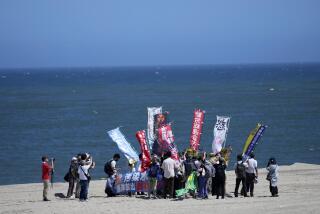Japanese Official Quits in Nuclear Accident
- Share via
TOKYO — A former president of the company blamed for Japan’s worst nuclear accident resigned Friday from a government-affiliated organization to express remorse for the radiation leak.
Toshiki Takagi served as president of JCO Co., which ran the uranium processing plant where the accident occurred, from June 1995 until June this year, Kyodo News Service reported. Takagi quit his job as president of the Metal Mining Agency of Japan, Kyodo said.
Takagi told Kyodo that he feels a “strong moral responsibility” as a former president of JCO. People in leadership positions frequently resign in Japan to take responsibility for mistakes.
Police have been investigating the Sept. 30 accident in Tokaimura, 81 miles northeast of Tokyo, which set off an atomic reaction that continued for nearly a day, sending three workers to the hospital and exposing at least 46 other people to radiation. JCO executives could face criminal charges of professional negligence.
Meanwhile, Moriki Aoyagi, president of Sumitomo Metal Mining Co., which owns JCO, said Friday that he will resign from the chairmanship of the Japan Mining Industry Assn., Kyodo said. Aoyagi reportedly said he wants to concentrate on dealing with the aftermath of the nuclear accident.
Elsewhere, an official with Japan Nuclear Fuel said Friday that a small amount of radiation leaked from two barrels at a disposal center for contaminated materials in northeastern Japan.
The radiation released was far below the level permitted by law, said Shuetsu Shimaya, an official with the company that was inspecting the plant. Shimaya said the leaks at the disposal center in Rokkasho, 360 miles northeast of Tokyo, were discovered during the inspection.
The barrels contained radioactive material from a Tokyo Electric Power Co. nuclear power plant in Fukushima prefecture. One barrel was found leaking Sept. 28, and the second was discovered Thursday.
The disclosure came as authorities conducted inspections of the nation’s nuclear facilities to check on safety standards and prevent further accidents.
Japan depends on atomic power for about a third of its energy needs, but the Tokaimura accident has shattered a Japanese myth that sophisticated technology and meticulous workers ensure the safety of its nuclear facilities.
JCO had been regularly skipping crucial security steps, using buckets instead of the proper equipment to mix the uranium and using undertrained workers.
Although government officials say the area is now safe, residents continue to flood health centers to get checked for radiation exposure.
Fears about the Tokaimura plant also are causing more suffering for residents by driving down prices for farm goods produced there and prompting cancellations at the region’s tourist hotels.
Tokaimura draws few visitors, but the accident is likely to take a toll on hotels closer to nearby beaches, mountains and lush parklands. September and early October are not busy times for the area, but hotels and inns might feel the real pain later in the autumn, when tourists usually come to bathe in hot springs and to admire the mountain foliage, officials said.
“We’re worried about what’s going to happen in the fall season,” said Nobuko Yamakoshi of Ibaraki prefecture’s tourist section.
More to Read
Sign up for Essential California
The most important California stories and recommendations in your inbox every morning.
You may occasionally receive promotional content from the Los Angeles Times.













